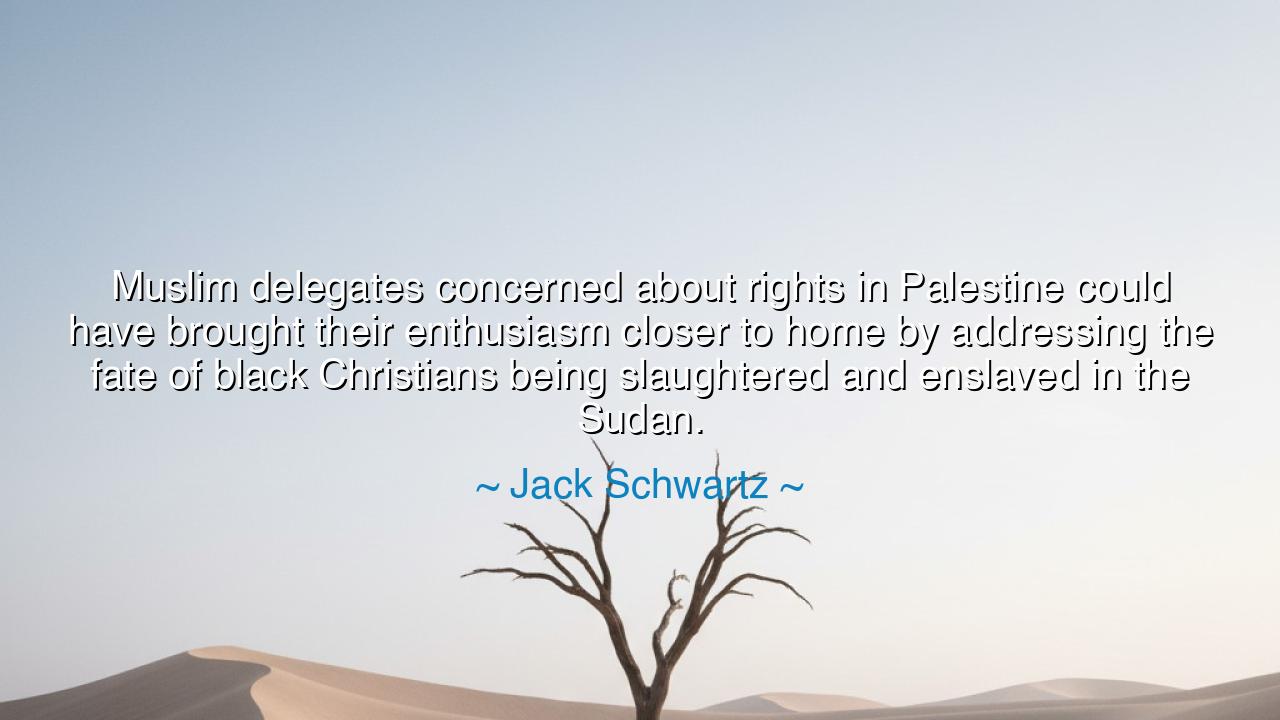
Muslim delegates concerned about rights in Palestine could have
Muslim delegates concerned about rights in Palestine could have brought their enthusiasm closer to home by addressing the fate of black Christians being slaughtered and enslaved in the Sudan.






There are words that pierce not to wound, but to awaken — words that summon the mind to look beyond the narrow field of its own sympathies. So it was when Jack Schwartz declared: “Muslim delegates concerned about rights in Palestine could have brought their enthusiasm closer to home by addressing the fate of black Christians being slaughtered and enslaved in the Sudan.” These are not words of anger, but of challenge — a call to conscience, reminding humanity that justice is not selective, and that compassion loses its sanctity when it is confined to the borders of tribe, creed, or cause. Schwartz, in this moment, held up a mirror to the hypocrisy that often shadows even the most righteous struggles, bidding all who fight for freedom to look beyond themselves.
In this saying, Schwartz does not condemn empathy for one cause; rather, he exposes the tragedy of partial empathy — the kind that burns brightly for the suffering that aligns with one’s identity, yet flickers out when the victims look, worship, or speak differently. He points to the Palestinian conflict, a cause long championed across the Muslim world, and contrasts it with the silent horror then unfolding in Sudan, where black Christians were being massacred and enslaved during the Second Sudanese Civil War. His question, though framed within a specific time and place, echoes across all ages: What is the worth of our compassion if it does not extend to all who bleed?
This is a theme as ancient as humanity itself. In every age, noble causes have been shadowed by selective morality. The Greeks spoke of justice (dikaiosyne) as harmony — the proper ordering of soul and society. Yet, even in their democracy, slaves and foreigners found no share in its blessings. The same contradiction has repeated itself through time: the revolutionary France that cried liberté while subjugating colonies; the America that declared all men are created equal while keeping others in chains. Schwartz’s words, then, are a modern echo of an old truth: that true righteousness is universal, not tribal.
Consider the story of William Wilberforce, the English parliamentarian who led the fight to abolish the slave trade. He was a man of deep Christian faith, yet his mission was not limited to Christians alone. He fought for the enslaved in lands he would never see, for people who did not share his culture or creed. His empathy was not narrow, but expansive, and in that expansiveness lay his greatness. Schwartz’s quote demands this same courage of moral vision — to see humanity not through the lens of allegiance, but through the eternal light of conscience.
What makes his words so powerful is their balance of praise and rebuke. He does not scorn those who feel for the suffering in Palestine; indeed, he recognizes their compassion. But he calls them — and by extension, all of us — to widen that compassion. It is easy to cry for those who resemble us; it is harder to weep for those we have been taught to ignore. Yet this is the higher path — the way of the prophets, the sages, and the peacemakers of all ages. For justice divided by loyalty ceases to be justice; it becomes politics of the soul.
In truth, the Sudan of which Schwartz speaks was a land torn by contradictions of faith and ethnicity — where the ancient evil of slavery returned under the cover of holy war. Villages burned, families were torn apart, and children were sold into bondage. The world largely looked away, distracted by louder conflicts or blinded by moral fatigue. By invoking this example, Schwartz demanded accountability not only from the Muslim delegates he addressed, but from every nation, every movement, and every individual who claims to care for justice while turning a blind eye to inconvenient suffering.
His lesson, therefore, reaches beyond religion or politics — it touches the very essence of moral consistency. The wise of every age have taught that integrity means wholeness, and wholeness requires unity between thought and action, belief and empathy. To grieve only for one’s own is to live with a divided heart. Schwartz’s words summon us to heal that division, to practice a compassion that is neither narrow nor self-serving.
So let this be the teaching passed down: Do not let your empathy have borders. Speak not only for the cause that stirs your blood, but for the silent ones whose cries are drowned in the noise of partisanship. Remember always that justice is one body — and when one limb suffers, the whole is wounded. Whether the oppressed stand in Gaza, in Khartoum, in Kyiv, or in any corner of the earth, let our hearts move toward them all. For only when we care for the suffering of the stranger as fiercely as we do for our own kin shall we fulfill the promise of our humanity — and rise, as the ancients dreamed, to become truly whole.






AAdministratorAdministrator
Welcome, honored guests. Please leave a comment, we will respond soon